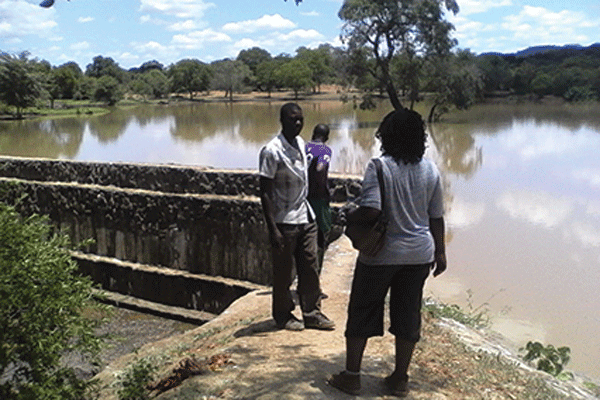
A GROUP of women burst into song, as they began harvesting their butternut crop at Matande Garden in the heart of rural Mwenezi. After some time of consuming the delicious fruit, the women are happy that at least they have a surplus to sell at the nearby Neshuro business centre, where there is a ready market.
BY JAIROS SAUNYAMA

This is the story of Mwenezi’s successful water-harvesting project that gave birth to the popular Matande Garden, where 167 farmers are benefiting from different farming projects all year round because of the availability of water.
“Before this project, it was bad. We could not farm all year round, our livestock had to scavenge for drinking water. But life has changed for the better; I have plenty to eat with my children and grandchildren. On the small piece of land I tilled this time, I have maize, groundnuts and butternuts. The butternuts are ready and I am removing them so that I plant beans,” 71-year-old, Violet Moyo of Rutavo Village, a farmer at the garden, said.
The Matande Garden project was made possible by the World Food Programme (WFP) under the productive assets creation programme (PAC) with the Mwenezi Development Training Centre (MDTC) as the implementing partner.
The project began in 2012, where 250 people were involved in the rehabilitation of the dam, extension of the garden and the construction of a weir. In order to harness more water, another weir was built at the foot of the nearby Matande Hill to catch all the running water from the inselberg.
The 4,5 ha garden brought the new face of a vibrant micro-irrigation, which is well-networked with water channels including a 40 000-litre receiving tank supported by two engines. Of the 167 beneficiaries, there 130 women, while the remaining 37 are male farmers.
Matande Garden chairperson, Taurai Moyo says villagers’ lives have been transformed and that the project has gone a long way in alleviating hunger in the dry region.
- Chamisa under fire over US$120K donation
- Mavhunga puts DeMbare into Chibuku quarterfinals
- Pension funds bet on Cabora Bassa oilfields
- Councils defy govt fire tender directive
Keep Reading
“We are happy that the water-harvesting project has yielded results in that hunger is now a thing of the past as villagers can now farm throughout the year. Before, there was massive shortage of water and the garden was just a hectare. There was no production at all.
“Today, it is different and through hard work, the farmers have a lot to feed their families, while others now sell the surplus, thereby, generating income to pay school fees for their children,” he said.
Moyo said, about 290 households from the six villages, as well as 2 000 livestock, are currently benefiting from the weirs. All the 167 farmers pay a dollar monthly, which is used to purchase fuel for the water engines, as well as purchasing seeds, fertilisers and other inputs.
Each beneficiary has a 1x82m piece of land to practice crop rotation under the guidance of an Agritex officer.
The water-harvesting project has not benefited villagers in the Makande area only, but more than 500 people are also benefiting in Makotore Village following the rehabilitation of Tsvimborume Weir Dam.
When NewsDay visited Tsvimborume Nutritious Garden recently, villagers were in the process of harvesting their maize crop, while others were planting beans.
Both the weir and dam projects were completed through the 2015 cycle of WFP’s productive asset creation programme and are benefiting nine villages including Tsumele, Mavange and Duvai among others. A total of 592 households with a population of 2 239 and 7 773 livestock are now benefiting from the weir. Tsvimborume Dam was sited and pegged in 1995 by Agritex, but construction was stalled due to lack of resources.
MDTC programmes manager, Promise Makoni says there is need to empower the community for the sustainability of the project.
“The projects were identified by the communities themselves, so in terms of sustainability the element is there because they identified these projects that they felt would enhance their livelihoods. And in this case as development practitioners together with government line ministries, we will continue to provide technical support in the projects so that their tomorrow will be a success,” she said.
Mwenezi is the driest district in Masvingo province and receives low, erratic and poorly distributed rainfall, averaging 350mm in a normal year. The area is still reeling from the recent El-Nino effects that left a number of households in dire need of food aid.
WFP Zimbabwe representative and country director, Eddie Rowe says their obligation is to address hunger and ensure food security in the dry region.
“Addressing both the root causes and consequences of hunger is critical to long-term food security and sustainable development.
“Through the PAC programme, WFP supports people beyond their immediate needs, helping them build a better future, where even the most vulnerable can thrive under a changing climate.
“Through PAC, we reached 95 000 people in 2016, with the rehabilitation or creation of community assets, such as water-harvesting systems like the one at Matande. In 2016 again, we rehabilitated 55 assets, bringing to 921 the total in the country since inception of the PAC programme in 2014,” he said.
Today, Moyo is one of the happiest women in Ward 2, Mwenezi, as the water-harvesting project has ensured food security and improved nutrition at her homestead.
She and other beneficiaries look forward to when they will secure a big market, with one of the leading chain stores in the country.











